| |
| |

|
| ●Organizers: |
Kobe
City, NPO Knots
|
●Co-organizer: |
Kobe
Society for the Prevention of Cruelty to Animals(Festival)
|
| ●Special
Sponsor: |

(The name 'Friskies K.K.' was changed in September 2002)
|
| ●Subsidizing Organization: |
Tsutomu
Nakauchi Foundation, Portopia '81 Memorial Fund
|
| ●Dates: |
Part1:Thursday
19th September 2002, 13:00-17:00
Part2:Friday
18th October 2002, 13:00-17:00
Festival:Saturday
19th October 2002, 13:00-16:00
|
| ●Venue: |
International Symposium: Portopia Hotel
Festival: The gymnasium in Motoyama Daini (No.2) Elementary School
|
| ●Participating
& Cooperating Organizations: |
Veterinary Association of Kobe City, Hyogo Guide Dogs for the Blind Association,
Committee for the Promotion of Assistant Dogs Development, Support Dogs
Association, Japan Riding Association for the Disabled, Akashi Riding
Association, JFA Japan Frisbee Dogs Association Hyogo Branch
|
| ●Supporting
Organizations: |
Ministry
of Environment, Ministry of Health, Labor and Welfare, Ministry of Education,
Culture, Sports, Science and Technology, Hyogo Prefecture, Hyogo Prefecture
Board of Education, Kobe City Board of Education, Kobe City PTA Federation,
Kobe Medical Association, Japan Veterinary Medical Association, Veterinary
Association of Hyogo Prefecture, Veterinary Association of Kobe City,
Japan Animal Welfare Society Hanshin Branch, Embassy of Sweden, Consulate
General of the United States of America Osaka-Kobe Kansai American Center |
|
| |
|
|

|
| |
|
| Recognition
of the significance of animals co-living with children is spreading.
However there are also growing concerns about the allergies and
other ‘animal originating’ infections and their effect on children’s
health. Despite the high concern and interest, this is a field that
specialists have not yet had much opportunity to explain to the
public or provide them with adequate information. As a consequence,
the public harbors a vague sense of worry and will sometimes overreact
when a problem is reported. Therefore, the core of this symposium
would feature highly interesting reports about allergy issues. This
will be supported by specialist knowledge and information will be
provided through an exchange of opinions. This was provided at a
level easy for the general public to understand and positioned as
a public health issue. |
|
| |
|
| |
|
| |
|
| ●Time
& Date: |
Thursday
19th September 2002, 13:00-17:00
|
●Venue: |
Portopia
Hotel, (link
to their website, in English)
'Grand Banquet Room KAIRAKU' (Main Building)
10-1,6 Chome, Minatojima Nakamachi, Chuo-ku, Kobe, Japan
|
| ●Speakers: |
Core Topic (approx. 1 hour):
"Animal exposure during early life and
later allergy development"
Dr. Bill HESSELMAR M.D.,
Ph.D.
Consultant Pediatrician at the Allergy
Unit,
The Queen Silvia Children's Hospital, Gothenburg Sweden
Also see, a research report from Sweden on human allergies:
"Does Early Exposure to a Cat or Dog Protect Against Later Allergy
Development?"
(click to read report in full)
"Zoonosis
Control in Japan"
Dr. NAKAJIMA Kensuke
D.V.M., M.S.
Deputy Director,
Tuberculosis and Infectious Diseases
Control Division
Health Service Bureau,
Ministry of Health, Labour and Welfare, Japan
Panel Discussion
Chairperson:
Prof. UEMURA Takashi
Veterinary, Public Health,Graduate School of Agriculture and Biological
Science, Osaka Prefecture University, Japan
Panelists:
Dr. Bill HESSELMAR M.D., Ph.D.
Dr. NAKAJIMA Kensuke D.V.M., M.S.
Prof.FUJITA Koichiro M.D.,D.M.S.
Division of Public Health, International Health Promotion, Environmental
Parasitology, Tokyo Medical and Dental University, Japan
Dr. YAMAOKA Koji
Kobe City General Hospital,
Pediatrics Dept, Japan
|
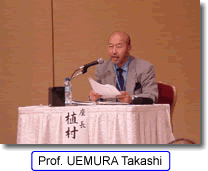 Professor
Takashi UEMURA of Osaka Prefecture University chaired the ‘Live
Love Animals International Symposium ? Part 1’, and the keynote
speech was made by Dr. B. HESSELMAR, M.D., Ph.D. of The Queen
Silvia Children’s Hospital, Gothenburg, Sweden. Professor
Takashi UEMURA of Osaka Prefecture University chaired the ‘Live
Love Animals International Symposium ? Part 1’, and the keynote
speech was made by Dr. B. HESSELMAR, M.D., Ph.D. of The Queen
Silvia Children’s Hospital, Gothenburg, Sweden. |
|
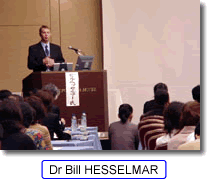
|
Dr.
Hesselmar spoke about research reports into the relationship between
allergies (and asthma) in Swedish children and their keeping of
animals during early childhood, a comparison that also considered
the number of siblings. Results, Dr. Hesselmar revealed, show
that living with animals (furred animals, mainly dogs and cats)
does not increase the risk of developing allergies and asthmas
and, on the contrary, seems to aid developing tolerance. |
|
 Dr.
Kensuke NAKAJIMA of the Ministry of Health, Labor and Welfare
provided the second keynote speech. Dr. Nakajima talked about
the current situation of new infectious diseases and zoonosis,
and the Japanese Government’s countermeasures. He stressed that
many of these diseases are preventable, and greater safety in
animal keeping is attainable, if there is greater knowledge about
the diseases and if owners assume greater responsibility for keeping
their animals in a healthy condition. Dr. Nakajima also warned
of the dangers of keeping wild or imported animals without first
knowing if they carry a contagious disease or not. Dr.
Kensuke NAKAJIMA of the Ministry of Health, Labor and Welfare
provided the second keynote speech. Dr. Nakajima talked about
the current situation of new infectious diseases and zoonosis,
and the Japanese Government’s countermeasures. He stressed that
many of these diseases are preventable, and greater safety in
animal keeping is attainable, if there is greater knowledge about
the diseases and if owners assume greater responsibility for keeping
their animals in a healthy condition. Dr. Nakajima also warned
of the dangers of keeping wild or imported animals without first
knowing if they carry a contagious disease or not. |
| |
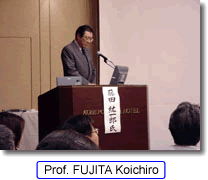 Following
the speeches, one of the panelists, Professor Koichiro FUJITA
of Tokyo Medical and Dental University explained about zoonosis
in general and how to prevent infections. Professor Fujita said
that the most important factor is for people themselves to be
healthy and to always wash and disinfect their hands appropriately
after coming into contact with animals. Furthermore, with better
awareness of zoonosis, people need to give more consideration
to the well-being of animals. Following
the speeches, one of the panelists, Professor Koichiro FUJITA
of Tokyo Medical and Dental University explained about zoonosis
in general and how to prevent infections. Professor Fujita said
that the most important factor is for people themselves to be
healthy and to always wash and disinfect their hands appropriately
after coming into contact with animals. Furthermore, with better
awareness of zoonosis, people need to give more consideration
to the well-being of animals. |
| |
| 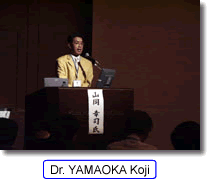 Another
panelist, Dr. Koji YAMAOKA of Kobe City General Hospital commented
from a pediatrician’s perspective. He gave an example of one
patient, a 10 year-old boy, whose asthma allergy was probably
induced by his living with cats. He said that, even if the patient’s
allergy is induced by his / her animal, if living with animals
is an important quality of life factor, then that lifestyle
should be respected and maintained as far as possible. Any treatment
regimen should be started from that basis. Whatever the case,
Dr. Yamaoka said that it is important to maintain an animal
in good health, and establish the appropriate condition for
both animal and owner. Another
panelist, Dr. Koji YAMAOKA of Kobe City General Hospital commented
from a pediatrician’s perspective. He gave an example of one
patient, a 10 year-old boy, whose asthma allergy was probably
induced by his living with cats. He said that, even if the patient’s
allergy is induced by his / her animal, if living with animals
is an important quality of life factor, then that lifestyle
should be respected and maintained as far as possible. Any treatment
regimen should be started from that basis. Whatever the case,
Dr. Yamaoka said that it is important to maintain an animal
in good health, and establish the appropriate condition for
both animal and owner.
|
| |
| |
| Following
the speeches and comments, Professor Uemura assumed the role of
MC and led a panel discussion together with a question and answer
time. The audience had listened attentively to all the speeches
and comments and several questions were asked. In conclusion,
Professor Uemura summarized that, in order to ensure adequate
safety in living with an animal, there are two stages or two kinds
of disease prevention. The main form of prevention is to have
and maintain a good environment for both animals and people including
proper animal handling. This should be based on correct information
about animal caused diseases. The second form of prevention is
that, even if already infected by an animal, it is still very
important to have correct knowledge about such infections and
handle the animal appropriately, including the possible need to
keep the animal and individual separated. The general consensus
among the panel was that, recent social obsessions with cleanliness
and hygiene have possibly weakened people’s immunity and resistance
to allergies. It is therefore essential that people live with
their animals appropriately and be correctly informed about zoonosis.
This is necessary for the welfare of both animals and children. |
| |
| |
| |
|
| |
|
| |
| |
|
| The importance
of children having a healthy value for life, and various child
psychological issues are topics that have become increasingly
prominent recently. Parallel to this, there has been a growing
interest for the influence that animals have on children. Especially
overseas, various psychology-related research has been conducted
while in Japan the need for more serious research and accurate
information appears to be increasing. People are seeking to know
the most ideal and appropriate ways to live together with animals.
This symposium was therefore designed to be a stage from which
to report the most advanced discoveries and case studies. In so
doing, it aims to provide answers to questions that people are
interested to know about. |
|
| |
|
| |
|
| |
|
| ●Time
& Date: |
Friday
18th October 2002, 13:00-17:00
|
| ●Venue: |
Portopia
Hotel (link
to their website, in English)
'Grand Banquet Room OHWADA' (South Wing)
10-1, 6 Chome, Minatojima Nakamachi, Chuo-ku, Kobe, Japan
|
| ●Speakers: |
Core
Topic (approx. 1 hour):
"Children, Animals and Humane Education"
Ms. Julie BANK
Director,
Public Programs and Development
Maricopa County Animal Care and Control,
Phoenix, Arizona, USA
"Children,
Animals, and Empathy:
Sharing Emotions - Antidote for Aggression and Violence? "
Prof. Frank R. ASCIONE, Ph.D.
Professor at Department of Psychology,
Utah State University, USA
Panel Discussion
Chairperson:
Ms. YAMAZAKI Keiko , Pet
Researcher, Japan
Panelists:
Ms. Julie BANK
Prof. Frank R. ASCIONE, Ph.D.
Mr. MIYAKAWA Yaki
School Inspector,
Elementary & Secondary Education Bureau, Ministry of Education,
Culture, Sports and Science, Japan
Prof. IIKURA Yoji, M.D., Ph.D.
Professor and Chief, Department
Of Pediatrics,
Showa University School Of Medicine, Japan
|
 Introduced
by Pet Researcher, Ms. Keiko YAMAZAKI, the keynote speech was
given by Ms. Julie BANK, Director of Public Programs and Development,
Maricopa County Animal Care and Control, Phoenix, Arizona. Introduced
by Pet Researcher, Ms. Keiko YAMAZAKI, the keynote speech was
given by Ms. Julie BANK, Director of Public Programs and Development,
Maricopa County Animal Care and Control, Phoenix, Arizona. |
| |
 Ms.
Bank talked about the importance of people receiving ‘Humane
Education’, with practical programs that go beyond words alone,
She explained about the effectiveness of practical animal programs.
Ms. Bank also pointed out that ‘Humane Education’ is key to
the fundamental treatment of several social issues and problems,
as well as being essential to a child’s education. Therefore,
she said, it is very important to use animal-people programs,
either for use within families or within society. Ms.
Bank talked about the importance of people receiving ‘Humane
Education’, with practical programs that go beyond words alone,
She explained about the effectiveness of practical animal programs.
Ms. Bank also pointed out that ‘Humane Education’ is key to
the fundamental treatment of several social issues and problems,
as well as being essential to a child’s education. Therefore,
she said, it is very important to use animal-people programs,
either for use within families or within society. |
|
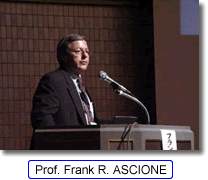 The
second keynote speaker was Professor Frank R. ASCIONE Ph.D. of
Utah State University. Professor Ascione provided real case studies
from America about children that have committed crimes. He reported
that children with a history of abusing animals grow up with a
3~4 times greater tendency to commit a crime later in life than
children with no such history. There is therefore a strong relationship
between animal abuse and violence towards other people. Recently
the problems of DV (domestic violence) and child abuse have become
more apparent in Japanese society. Professor Ascione also reported
that as many as 54% of the women in DV cases were assaulted by
a partner with a record of abusing animals. He believes that the
relationship between animals and children is almost certainly
an important factor in determining the healthy development of
sociability in children, and stressed the importance of Humane
Education for children. The
second keynote speaker was Professor Frank R. ASCIONE Ph.D. of
Utah State University. Professor Ascione provided real case studies
from America about children that have committed crimes. He reported
that children with a history of abusing animals grow up with a
3~4 times greater tendency to commit a crime later in life than
children with no such history. There is therefore a strong relationship
between animal abuse and violence towards other people. Recently
the problems of DV (domestic violence) and child abuse have become
more apparent in Japanese society. Professor Ascione also reported
that as many as 54% of the women in DV cases were assaulted by
a partner with a record of abusing animals. He believes that the
relationship between animals and children is almost certainly
an important factor in determining the healthy development of
sociability in children, and stressed the importance of Humane
Education for children. |
|
 After
the break, one of the panelists, Mr. Yaki MIYAKAWA, from the Japanese
Ministry of Education, Culture, Sports and Science, told the heart-warming
story of his memories of a childhood filled with animals. He then
introduced the new direction within the school curriculum for
nurturing humanity and sociability in children, and how necessary
it is to provide children with opportunities to consider the importance
of Life through caring for school animals and holding classes
in Humane Education. Likewise he referred to the importance of
the school, the home and the community to tie up in educating
children to be kind to animals and other people. After
the break, one of the panelists, Mr. Yaki MIYAKAWA, from the Japanese
Ministry of Education, Culture, Sports and Science, told the heart-warming
story of his memories of a childhood filled with animals. He then
introduced the new direction within the school curriculum for
nurturing humanity and sociability in children, and how necessary
it is to provide children with opportunities to consider the importance
of Life through caring for school animals and holding classes
in Humane Education. Likewise he referred to the importance of
the school, the home and the community to tie up in educating
children to be kind to animals and other people. |
|
 Another
panelist was Professor Yoji IIKURA M.D. Ph. D. of Showa University
School of Medicine who talked about his Dolphin Therapy. Professor
Iikura has used dolphins in treating children with atopy (sea
water treatment is good for the condition). When such children
go into the sea and come into contact with salt water they suffer
some initial discomfort and pain, but the presence of dolphins
seems to have a positive psychological influence to ease the pain.
He said that a questionnaire survey conducted after each child’s
treatment had confirmed this effect. He also reported that this
dolphin-based therapy had also seen positive changes in autistic
children, and that future research and possibilities in this field
are being considered. Following this the chairperson, Ms. Yamasaki,
added to this issue by pointing out that the current situation
of animal assisted therapy has, raised some concerns about the
correctness of using wild animals. Another
panelist was Professor Yoji IIKURA M.D. Ph. D. of Showa University
School of Medicine who talked about his Dolphin Therapy. Professor
Iikura has used dolphins in treating children with atopy (sea
water treatment is good for the condition). When such children
go into the sea and come into contact with salt water they suffer
some initial discomfort and pain, but the presence of dolphins
seems to have a positive psychological influence to ease the pain.
He said that a questionnaire survey conducted after each child’s
treatment had confirmed this effect. He also reported that this
dolphin-based therapy had also seen positive changes in autistic
children, and that future research and possibilities in this field
are being considered. Following this the chairperson, Ms. Yamasaki,
added to this issue by pointing out that the current situation
of animal assisted therapy has, raised some concerns about the
correctness of using wild animals. |
|
|
After the speeches and comments, the chairperson, Ms. Yamasaki
acted as a MC and conducted a panel discussion followed by a question
and answers time. An attentive audience had been listening to
all the speeches and comments so several questions were asked.
The beneficial effects of education on the treatment of animals
by children has been confirmed by the various types of research
and experimentation performed by the panelists but, in conclusion,
Ms. Yamasaki pointed out that it is extremely important to consider
the environment and the way animals are handled if they are used
in schools, animal assisted therapies, or recreational activities,
because these issues too have an influence on the children experiencing
them.
These two Symposia re-confirmed that having an environment where
children can share some time with animals is both physically and
psychologically positive and comfortable for children, and how
important it is for adults to provide children with, and maintain,
such an environment.
|
|
| |
|
|
| |
|
| Following
the theme of the international symposium, this ‘Festival for Children
and Dogs in Higashinada-ku’ will be held at an elementary school
within the Higashinada ward. Visitors and children to the event
will witness tips and advice for handling and caring for animals.
There will be demonstrations by assistant dogs to help people learn
more about dogs, a discipline class for dog owners to foster a greater
sense of responsibility, agility exercises and dog-run demonstrations.
Where possible we have asked the Symposium’s experts and specialists
to come and see the festival and invite their opinions and advice
on children’s education. |
|
| |
|
| |
|
| |
|
| ●Time
& Date: |
Saturday
19th October 2002, 13:00-16:00 |
| ●Venue:
|
The
gymnasium in Motoyama Daini (No.2) Elementary School |
| |
|
|
Despite
the rainy weather on the festival day and the subsequent necessity
to hold the event in the school gymnasium many children and visitors
from the Higashinada-ku area, and many from outside, visited the
Festival.
This was the first time such an event had been held at an elementary
school in Kobe City and, as official representative, the Higashinada
Ward Governor Mr. Takahashi gave a speech as did Mr. Yada, President
of the Kobe Society for the Prevention of Cruelty to Animals.
After the speeches the program began.
|
|
| Two
keynote speakers from the International Symposium Part 2 (held
the previous day, on the influence of animals on children from
the psychological perspective), Ms. Julie Bank and Professor Ascione
gave talks. Then, there were demonstrations of assistant and guide
dogs as well as discipline classes and discipline demonstrations.
The audience, consisting of many children, was clearly enthralled. |
|
|
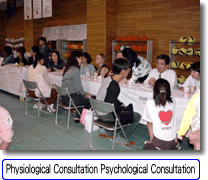 Each
of the participating organizations set up booths to introduce
their activities and work. Visitors were able to enjoy informative
conversations and try out games and quizzes. At the Consultation
Desk, Ms. Bank and Prof. Ascione were present to share their knowledge
on the psychological issues related to animals and children and
Dr. Yamaoka from Kobe City General Hospital kindly offered to
answer questions on more physiological topics. He received some
serious enquiries from concerned parents, and Ms. Bank and Prof.
Ascione were delighted that many children took the initiative
to come up and talk with them. Each
of the participating organizations set up booths to introduce
their activities and work. Visitors were able to enjoy informative
conversations and try out games and quizzes. At the Consultation
Desk, Ms. Bank and Prof. Ascione were present to share their knowledge
on the psychological issues related to animals and children and
Dr. Yamaoka from Kobe City General Hospital kindly offered to
answer questions on more physiological topics. He received some
serious enquiries from concerned parents, and Ms. Bank and Prof.
Ascione were delighted that many children took the initiative
to come up and talk with them. |
|
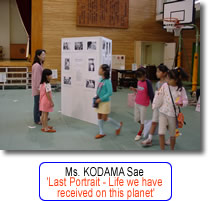 As in previous years, photographs by Ms. Sanae KODAMA and illustrations
by Mr. Satoshi OGURA were on exhibition and these appealed to
the children in particular. As the event was held in an elementary
school, many parents with children made up the attendance and
cheerfully interacted with other families and exhibitors. This
helped make the event all the more successful
As in previous years, photographs by Ms. Sanae KODAMA and illustrations
by Mr. Satoshi OGURA were on exhibition and these appealed to
the children in particular. As the event was held in an elementary
school, many parents with children made up the attendance and
cheerfully interacted with other families and exhibitors. This
helped make the event all the more successful
|
|
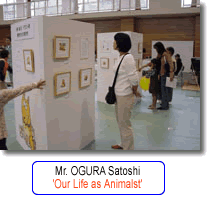 For Knots, holding the event in an elementary school was a valuable
experience. Knots wishes to extend a big thank you to all the
people related to Motoyama Daini (No. 2) Elementary School who
helped provide an excellent venue and gave such generous support
and cooperation.
For Knots, holding the event in an elementary school was a valuable
experience. Knots wishes to extend a big thank you to all the
people related to Motoyama Daini (No. 2) Elementary School who
helped provide an excellent venue and gave such generous support
and cooperation. |
| |
| |
| The
two symposia and the festival also enjoyed the support and cooperation
of many other individuals from around Japan and from overseas.
Knots feels that the importance of this year’s theme, and the
responsibilities adults have on the issue of children and animals,
was recognized by a great many people. Knots hopes that these
events were able to provide sufficient opportunities for many
people to more deeply consider what can be done to benefit animals
and the children who make up society’s future. Ultimately, it
is hoped that the event will give rise to more effort and more
awareness building in the future and expand on the issues discussed. |
| |
| |
|
| |
|
| |
| |


 Professor
Takashi UEMURA of Osaka Prefecture University chaired the ‘Live
Love Animals International Symposium ? Part 1’, and the keynote
speech was made by Dr. B. HESSELMAR, M.D., Ph.D. of The Queen
Silvia Children’s Hospital, Gothenburg, Sweden.
Professor
Takashi UEMURA of Osaka Prefecture University chaired the ‘Live
Love Animals International Symposium ? Part 1’, and the keynote
speech was made by Dr. B. HESSELMAR, M.D., Ph.D. of The Queen
Silvia Children’s Hospital, Gothenburg, Sweden. 
 Dr.
Kensuke NAKAJIMA of the Ministry of Health, Labor and Welfare
provided the second keynote speech. Dr. Nakajima talked about
the current situation of new infectious diseases and zoonosis,
and the Japanese Government’s countermeasures. He stressed that
many of these diseases are preventable, and greater safety in
animal keeping is attainable, if there is greater knowledge about
the diseases and if owners assume greater responsibility for keeping
their animals in a healthy condition. Dr. Nakajima also warned
of the dangers of keeping wild or imported animals without first
knowing if they carry a contagious disease or not.
Dr.
Kensuke NAKAJIMA of the Ministry of Health, Labor and Welfare
provided the second keynote speech. Dr. Nakajima talked about
the current situation of new infectious diseases and zoonosis,
and the Japanese Government’s countermeasures. He stressed that
many of these diseases are preventable, and greater safety in
animal keeping is attainable, if there is greater knowledge about
the diseases and if owners assume greater responsibility for keeping
their animals in a healthy condition. Dr. Nakajima also warned
of the dangers of keeping wild or imported animals without first
knowing if they carry a contagious disease or not. Following
the speeches, one of the panelists, Professor Koichiro FUJITA
of Tokyo Medical and Dental University explained about zoonosis
in general and how to prevent infections. Professor Fujita said
that the most important factor is for people themselves to be
healthy and to always wash and disinfect their hands appropriately
after coming into contact with animals. Furthermore, with better
awareness of zoonosis, people need to give more consideration
to the well-being of animals.
Following
the speeches, one of the panelists, Professor Koichiro FUJITA
of Tokyo Medical and Dental University explained about zoonosis
in general and how to prevent infections. Professor Fujita said
that the most important factor is for people themselves to be
healthy and to always wash and disinfect their hands appropriately
after coming into contact with animals. Furthermore, with better
awareness of zoonosis, people need to give more consideration
to the well-being of animals. Another
panelist, Dr. Koji YAMAOKA of Kobe City General Hospital commented
from a pediatrician’s perspective. He gave an example of one
patient, a 10 year-old boy, whose asthma allergy was probably
induced by his living with cats. He said that, even if the patient’s
allergy is induced by his / her animal, if living with animals
is an important quality of life factor, then that lifestyle
should be respected and maintained as far as possible. Any treatment
regimen should be started from that basis. Whatever the case,
Dr. Yamaoka said that it is important to maintain an animal
in good health, and establish the appropriate condition for
both animal and owner.
Another
panelist, Dr. Koji YAMAOKA of Kobe City General Hospital commented
from a pediatrician’s perspective. He gave an example of one
patient, a 10 year-old boy, whose asthma allergy was probably
induced by his living with cats. He said that, even if the patient’s
allergy is induced by his / her animal, if living with animals
is an important quality of life factor, then that lifestyle
should be respected and maintained as far as possible. Any treatment
regimen should be started from that basis. Whatever the case,
Dr. Yamaoka said that it is important to maintain an animal
in good health, and establish the appropriate condition for
both animal and owner.

 Introduced
by Pet Researcher, Ms. Keiko YAMAZAKI, the keynote speech was
given by Ms. Julie BANK, Director of Public Programs and Development,
Maricopa County Animal Care and Control, Phoenix, Arizona.
Introduced
by Pet Researcher, Ms. Keiko YAMAZAKI, the keynote speech was
given by Ms. Julie BANK, Director of Public Programs and Development,
Maricopa County Animal Care and Control, Phoenix, Arizona.  Ms.
Bank talked about the importance of people receiving ‘Humane
Education’, with practical programs that go beyond words alone,
She explained about the effectiveness of practical animal programs.
Ms. Bank also pointed out that ‘Humane Education’ is key to
the fundamental treatment of several social issues and problems,
as well as being essential to a child’s education. Therefore,
she said, it is very important to use animal-people programs,
either for use within families or within society.
Ms.
Bank talked about the importance of people receiving ‘Humane
Education’, with practical programs that go beyond words alone,
She explained about the effectiveness of practical animal programs.
Ms. Bank also pointed out that ‘Humane Education’ is key to
the fundamental treatment of several social issues and problems,
as well as being essential to a child’s education. Therefore,
she said, it is very important to use animal-people programs,
either for use within families or within society. The
second keynote speaker was Professor Frank R. ASCIONE Ph.D. of
Utah State University. Professor Ascione provided real case studies
from America about children that have committed crimes. He reported
that children with a history of abusing animals grow up with a
3~4 times greater tendency to commit a crime later in life than
children with no such history. There is therefore a strong relationship
between animal abuse and violence towards other people. Recently
the problems of DV (domestic violence) and child abuse have become
more apparent in Japanese society. Professor Ascione also reported
that as many as 54% of the women in DV cases were assaulted by
a partner with a record of abusing animals. He believes that the
relationship between animals and children is almost certainly
an important factor in determining the healthy development of
sociability in children, and stressed the importance of Humane
Education for children.
The
second keynote speaker was Professor Frank R. ASCIONE Ph.D. of
Utah State University. Professor Ascione provided real case studies
from America about children that have committed crimes. He reported
that children with a history of abusing animals grow up with a
3~4 times greater tendency to commit a crime later in life than
children with no such history. There is therefore a strong relationship
between animal abuse and violence towards other people. Recently
the problems of DV (domestic violence) and child abuse have become
more apparent in Japanese society. Professor Ascione also reported
that as many as 54% of the women in DV cases were assaulted by
a partner with a record of abusing animals. He believes that the
relationship between animals and children is almost certainly
an important factor in determining the healthy development of
sociability in children, and stressed the importance of Humane
Education for children. After
the break, one of the panelists, Mr. Yaki MIYAKAWA, from the Japanese
Ministry of Education, Culture, Sports and Science, told the heart-warming
story of his memories of a childhood filled with animals. He then
introduced the new direction within the school curriculum for
nurturing humanity and sociability in children, and how necessary
it is to provide children with opportunities to consider the importance
of Life through caring for school animals and holding classes
in Humane Education. Likewise he referred to the importance of
the school, the home and the community to tie up in educating
children to be kind to animals and other people.
After
the break, one of the panelists, Mr. Yaki MIYAKAWA, from the Japanese
Ministry of Education, Culture, Sports and Science, told the heart-warming
story of his memories of a childhood filled with animals. He then
introduced the new direction within the school curriculum for
nurturing humanity and sociability in children, and how necessary
it is to provide children with opportunities to consider the importance
of Life through caring for school animals and holding classes
in Humane Education. Likewise he referred to the importance of
the school, the home and the community to tie up in educating
children to be kind to animals and other people. Another
panelist was Professor Yoji IIKURA M.D. Ph. D. of Showa University
School of Medicine who talked about his Dolphin Therapy. Professor
Iikura has used dolphins in treating children with atopy (sea
water treatment is good for the condition). When such children
go into the sea and come into contact with salt water they suffer
some initial discomfort and pain, but the presence of dolphins
seems to have a positive psychological influence to ease the pain.
He said that a questionnaire survey conducted after each child’s
treatment had confirmed this effect. He also reported that this
dolphin-based therapy had also seen positive changes in autistic
children, and that future research and possibilities in this field
are being considered. Following this the chairperson, Ms. Yamasaki,
added to this issue by pointing out that the current situation
of animal assisted therapy has, raised some concerns about the
correctness of using wild animals.
Another
panelist was Professor Yoji IIKURA M.D. Ph. D. of Showa University
School of Medicine who talked about his Dolphin Therapy. Professor
Iikura has used dolphins in treating children with atopy (sea
water treatment is good for the condition). When such children
go into the sea and come into contact with salt water they suffer
some initial discomfort and pain, but the presence of dolphins
seems to have a positive psychological influence to ease the pain.
He said that a questionnaire survey conducted after each child’s
treatment had confirmed this effect. He also reported that this
dolphin-based therapy had also seen positive changes in autistic
children, and that future research and possibilities in this field
are being considered. Following this the chairperson, Ms. Yamasaki,
added to this issue by pointing out that the current situation
of animal assisted therapy has, raised some concerns about the
correctness of using wild animals.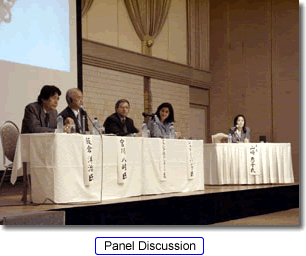

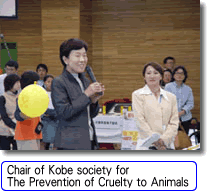

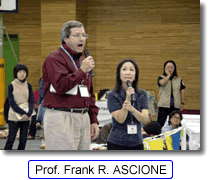
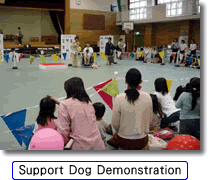
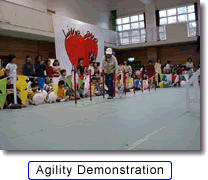
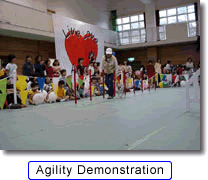

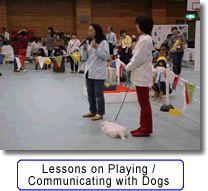
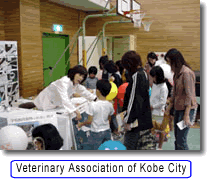

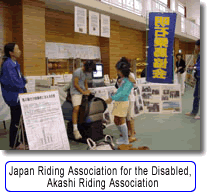
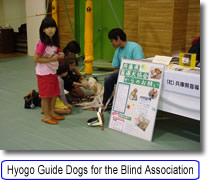
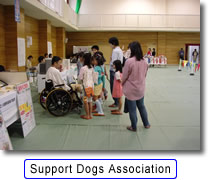
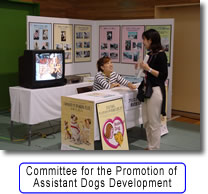

 As in previous years, photographs by Ms. Sanae KODAMA and illustrations
by Mr. Satoshi OGURA were on exhibition and these appealed to
the children in particular. As the event was held in an elementary
school, many parents with children made up the attendance and
cheerfully interacted with other families and exhibitors. This
helped make the event all the more successful
As in previous years, photographs by Ms. Sanae KODAMA and illustrations
by Mr. Satoshi OGURA were on exhibition and these appealed to
the children in particular. As the event was held in an elementary
school, many parents with children made up the attendance and
cheerfully interacted with other families and exhibitors. This
helped make the event all the more successful For Knots, holding the event in an elementary school was a valuable
experience. Knots wishes to extend a big thank you to all the
people related to Motoyama Daini (No. 2) Elementary School who
helped provide an excellent venue and gave such generous support
and cooperation.
For Knots, holding the event in an elementary school was a valuable
experience. Knots wishes to extend a big thank you to all the
people related to Motoyama Daini (No. 2) Elementary School who
helped provide an excellent venue and gave such generous support
and cooperation.